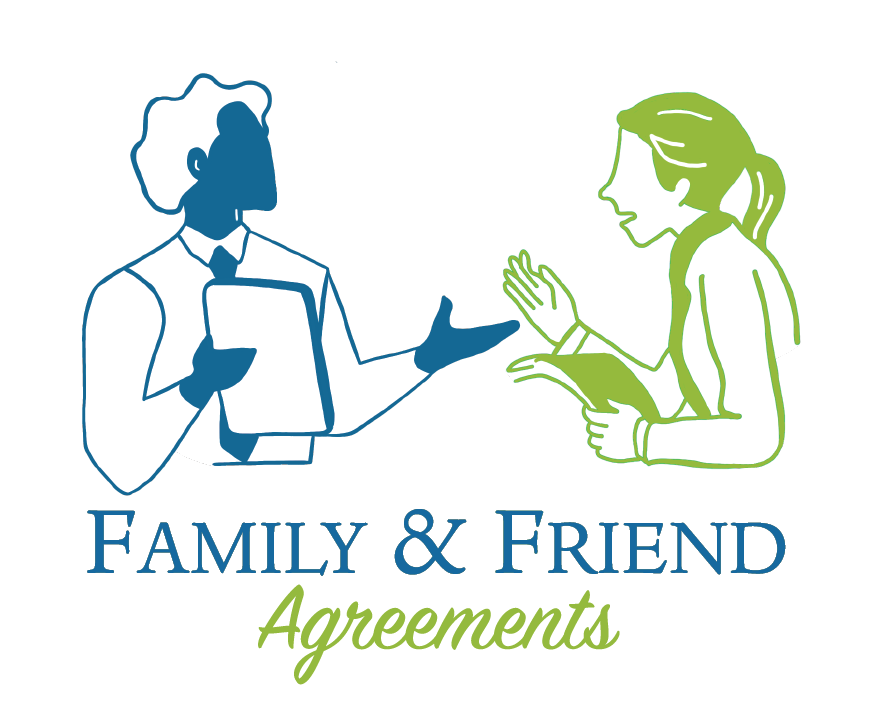Hellooo! Family and Friends Agreements
“You deserve better than a handshake, ‘just trust me’ or even a pinky promise.”
-Deborah Hutchison
Family and friends. That’s who people turn to first when they need help, and that’s the way it should be. Unfortunately, we have all heard horror stories about close relationships torn apart because of misunderstandings about money, property, or responsibility.
“Neither blood nor friendship can simplify a complicated arrangement. Good intentions won’t neutralize misunderstandings.”
An agreement, if you use one, can relieve a good bit of stress. Think of it as a professional approach to a personal transaction. Even family members and dear friends, who usually see eye to eye, can encounter roadblocks (or mindsets) when asking for favours or engaging in activities together. So, yes, especially, family members and close friends will benefit from using an agreement. In fact, they may have the most to lose from NOT using an agreement.
Have you ever lent money to a friend, only to find yourself minus $50, $500, or $5,000—and minus the friendship, as well? Have you ever agreed to let a family member live under your roof temporarily, only to find yourself cramped, frustrated and irritable, because you hadn’t specified when the arrangement would end, not to mention designating which parts of your residence your guest could use? Have you ever argued with a roommate over who gets to keep the dog you shared, when you, both, love the dog, but can no longer stand each other?
When people let us down, especially those close to us, the emotional fallout can be traumatic. After all, a trust has been breached and, most often, there is no record of what has transpired. If the parties are still speaking at all, their conversations have probably eroded into “he said . . . she said . . .” And before long, the ill will begins to spread like a virus.
Helping someone close to you can be an incredibly rewarding experience if you approach it correctly. If you set boundaries, explain your needs, and clarify what you expect, you can help or be helped by those you love and still maintain your relationship.
Why use an agreement with a family member or friend?
-
An agreement in hand takes an emotional request into a non-emotional proposal.
- It enables us to help the people we care about or to ask for help when we really need it.
-
An agreement is a commitment, a promise with documentation.
- By asking a loved one to put an agreement on paper, you will learn whether he or she is truly committed. If he or she is reluctant to “put it in writing”, consider that a red flag. On the flip side, when you see the expectations in writing, you may have second thoughts as well, and you can avoid making a mistake.
-
An agreement sets up a win-win situation.
- It encourages participants to foresee potential problems, establish boundaries and agree to ground rules, which will avoid honest misunderstandings later on.
- Writing out the details will alert you if you and your brother (or vice versa) are not on the same page and allow you to realign your expectations. When arranging for the care of your ageing father, for instance, your brother says he will visit your father every weekend, does that mean he will spend all day Saturday and Sunday with him? And cook his meals on both days?
- Your daughter, who asked to move back home, says she will pay rent when she gets a “real” job. Does part-time waitressing count as a real job? Many times, such questions go unaddressed when making oral agreements, because we didn’t think through the details. Writing everything down allows you to address fine points and avoid unnecessary misunderstandings.
-
An agreement keeps memories from fading.
- Five or ten years down the line, it may be difficult to remember whether you agreed to pay 4 % or 6 % interest on the loan your uncle extended when you bought your first car. Or you may recall your mom saying that, if the apartment you found had a “no-pets” clause, you could leave your cat with her. But now, she doesn’t remember saying anything of the sorts. Me-ouch!
- Misrepresenting history is harder if that history is written down. You can’t argue about whether something was a loan or a gift if you have paperwork. Your best friend, who goes off and sells your idea can’t claim he didn’t realize it was your creation if you’ve signed an agreement.
So, the next time you are asked to lend money, or perhaps you need to borrow money, use an agreement; when your teen gets his driver’s license and will be using the family car, use an agreement; should you decide to share a house or flat with others, set the parameters and use an agreement. There are all kinds of situations that call for written documentation of some sort.
“Once you start to write things down, you’ll see how it can give you peace of mind and become a valuable tool in your family life.”
Practical Approach PDF Pledge Published Commitment
Written by Deborah Hutchison for Dazzling Insights. Deborah is a problem solver, former teacher, published author, and an award-winning filmmaker. She sits on the Board of Directors of William Woods University, USA. Throughout her adult life, Deborah has felt the need for a way to communicate honestly and clearly in businesslike dealings with family members and friends. To that end, she created “Better than a Handshake -The Printed Promise,” a non-emotional guide to personal transactions among family and friends including easy- to-use agreements. You can learn more about this project at www.familyandfriendagreements.com.
Deborah’s interests include empowering women through Gutsy Gals Inspire Me - an online community of women of all ages who convene to inspire and be inspired, fundraising, family, and her four-footed gutsy gal, G.G.

